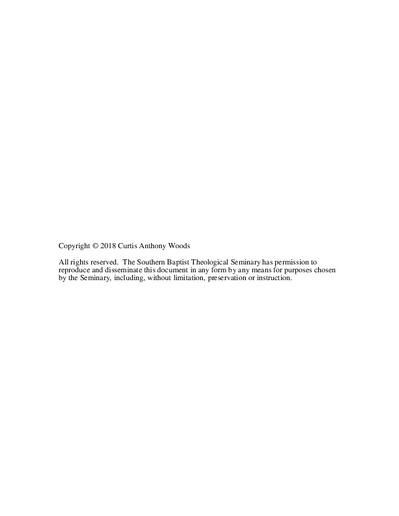The Literary Reception of the Spirituality of Phillis Wheatley (1753-1784): an Afrosensitive Reading
Subject
Wheatley, Phillis,1753-1784African Americans--Poetry
Poets, American--Colonial period, ca. 1600-1775
African American women poets
Slaves--United States
Abstract
This dissertation explores the theological and ethical preoccupations of Phillis Wheatley in colonial New England. Chapter 1 frames the conversation around relevant research and states the project thesis to explain Wheatley’s background and eventual role as mother of African-American literature. Wheatley manipulates neoclassical Greek mythological images to subversively critique British-American racial hierarchicalism.
Chapter 2 explains the meaning of an Afrosensitive hermeneutic, exploring the epistemological development of Afrocentric thought as a Eurocentric counterfactual. Bebbington’s quadrilateral is the exploratory portal used to discern Wheatley’s commitment to evangelical theology.
Chapter 3 assesses Wheatley’s critique of exemplary or open American exceptionalism through the lens of chattel slavery. Critical race theory becomes the analytical lens to understand the intersection of religion, race, class, and gender on Wheatley sociopolitical imagination.
Chapter 4 develops a conversation on social justice and neighbor love between Wheatley and St. Augustine (AD 354-430) of Hippo. Although Wheatley never directly quotes, she exemplifies Augustinian spirituality in her response to injustice. They both desire to restore the image of God through a comprehensive view of the gospel—vertical, horizontal, and cosmological.
Chapter 5 addresses Wheatley’s staunch commitment to Christian orthodoxy and social activism. She honored Christ as the exclusive way of salvation through literary apologetics in select poems. She also leveraged her privilege amongst societal influencers to advocate for the immediate emancipation of African peoples. Wheatley believed that enslavers lacked a comprehensive understanding of love. Hence, she confronted inconsistent religious and philosophical beliefs through her poetry and prose.
Chapter 6 summarizes the dissertation by demonstrating the theological and ethical commitments of a contemporary afrosensitive evangelical spirituality by critiquing key figures within the realm of Afrocentric spirituality, illustrating why afrosensitive evangelical spirituality reverences biblical authority while exercising cultural agency when examining African diasporic narratives.

